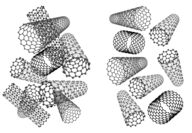Sorted by date Results 1 - 10 of 10

New study pinpoints critical metal accumulation around edges of ancient continental cores. In a groundbreaking study, researchers from Macquarie University have uncovered an ancient, hidden network of geological formations like "metal highways" beneath the Earth's ancient continental cores. Shaped over millions of years, these geological formations serve as corridors for deposits of critical metals such as cobalt, copper, and rare earth elements. The discovery provides a new... Full story

Ten teams recognized for groundbreaking solutions to reclaim critical materials. With potential billions of dollars in critical materials lost in discarded electronics each year, the U.S. Department of Energy has announced the first winners of its $4 million E-SCRAP competition, recognizing innovations that transform e-waste into a valuable resource for supply chains and sustainability. First announced in March, DOE saw the immense potential of recovering valuable and...

From reactor restarts to clean hydrogen, DOE gives nuclear watchlist. Building on the previous year of unprecedented progress for U.S. nuclear energy, 2025 is shaping up to be a defining year for the industry, with the U.S. Department of Energy spotlighting five critical developments that could redefine the energy landscape of America. The many successes achieved in nuclear energy during 2024 – from the commissioning of a new reactor to new breakthroughs in reactor design a...

Days before Trump's inauguration, proposed Chinese export restrictions target processes for battery components, critical mineral extraction and refinement. Critical mineral processing and battery tech exports from China appear to be the next casualty in a burgeoning trade war between Washington and Beijing, key players in the global economy with opposing views and a worldwide net-zero emissions goal in the balance. Earlier this month, China's Ministry of Commerce proposed...

Partnering to develop trolley assist for reduced emissions in underground mines. To bring the electric mine of the future one step closer to reality, global mining equipment manufacturer Epiroc and electrification technology leader ABB have joined forces to develop a trolley system to assist ore-laden haul trucks on their climb out of the depths of underground mines. "The decarbonization of mine haulage fleets is becoming increasingly pressing as we look towards 2030...

Partners with the leading network provider will connect robot and human lunar occupants. With a boost into space on the fenders of a lunar lander and intrepid rover, Nokia intends to prove cellular technology's potential for connecting future lunar explorations with NASA's upcoming IM-2 mission. After many long months of testing, the partnership announced the successful final integration of Nokia's Lunar Surface Communication System (LSCS) "network in a box" into Intuitive...

USA Rare Earths produces first batch of critical REE magnets at its Innovations Lab in Stillwater, Oklahoma. Crossing a major milestone on the path to breaking America's reliance on China for an essential component of electric vehicles, wind turbines, robotics and military technologies, USA Rare Earth LLC (USARE) has produced its first batch of rare earth magnets at its Innovations Lab in Oklahoma. "Our new Innovations Lab, which we will finish building out in the coming month...

New Supply Chain Resiliency Initiative aims to break America's reliance on China for minerals essential to transformative technologies. As the Chinese government brandishes its dominance over critical mineral supply chains as a weapon in an escalating trade war with the U.S., the Export-Import Bank of the United States (EXIM) is equipping critical minerals suppliers outside of the People's Republic of China (PRC) with a powerful new financing tool aimed at leveling the...

New lithium-sulfur battery achieves rapid charging, lasting stability. In a breakthrough that could reshape battery technology, researchers at the Daegu Gyeongbuk Institute of Science and Technology (DGIST) in Korea have developed a groundbreaking lithium-sulfur battery that can fully charge in just 12 minutes, leveraging a specially engineered carbon material to achieve rapid charging, higher energy capacity, and exceptional long-term durability. Considered a promising altern...

Scientists enhance next-generation battery manufacturing tech with new carbon nanotube powder. A team led by Joong Tark Han at the Korea Electrotechnology Research Institute (KERI) Nano Hybrid Technology Research Center has developed an improved carbon nanotube (CNT) powder that resolves a problematic tendency for these hollow tubes of rolled-up graphene to clump together and resist thorough mixing with other materials in dry processing. A dry process is a chemical-free... Full story